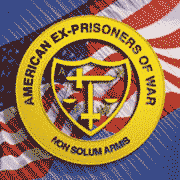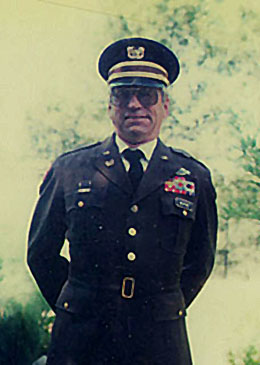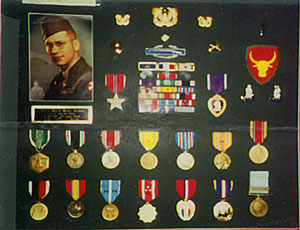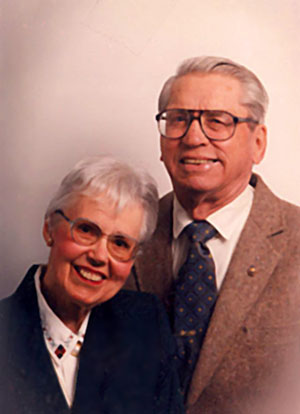
Established April 14, 1942
 |
American Ex-Prisoners of War
A not-for-profit, Congressionally-chartered veterans’ service organization advocating for former prisoners of war and their families.
Established April 14, 1942 |


Melvin H. Nesteby in Uniform
|

Melvin H. Nesteby , medal collection
|

Melvin and his wife, Katherine
|
| Last Name | First Name, Middle Init. | Nickname |
| Street Add. | City | State |
| Zip | Spouse | |
| Conflict | Branch of Service | Unit: |
| Theatre of Operation | Military Job | Where Captured |
| Date Captured | Time Interned | Camps |
| Date Liberated | Medals Received | Age at Capture |
| After the War ... | ||
Not only did the parents bequeath their children physical strength, but likewise, they provided them a strong spiritual basis for their lives. Their Lutheran faith was a sustaining element. During the depression years of the1930's, Mel was growing up. Because of the hard physical work on the home farm and the necessity to earn a living for himself and assist in supporting his family as a laborer on neighboring farms, his schooling frequently took second place.
However, this life gave him a love for all outdoor things: the sky, the clouds, all animal life, the seasons.
Mel enlisted in the Army on 17 May, 1941 in Fargo, N.D. He chose a warm part of the world, in contrast to the frigid temperatures of Alaska, in which to serve: the Philippine Islands over the Panama Canal Zone. Since he had been driving a big Caterpillar tractor in his farm work, he figured that he would be qualified for operating a tank.
At Fort Snelling, near St. Paul, Minn., Mel was sworn into the Army. Mel and some other recruits attended a service at a nearby Methodist Church. Each young man was presented a pocket-sized New Testament. This little book was a divine gift, with significance far beyond expectations. It sustained Mel through all his trials in the coming years. It brought the presence of Jesus to men who had reached the final hours of their lives: men so sick and so desparate that they were beyond recovery. This little Bible was confiscated by the Japanese at the time of surrender; but miraculously, it was returned to Mel. On its second page, it bears the stamp of the Japanese Imperial Army censor, with a date line inserted, and it is a sacred keepsake today.
Upon arrival in Manila, Mel was assigned to Company A, 1st Battalion, of the 31st Infantry Regiment, which was bivouacked in the Cortel d'Espana, part of Intramuros (Walled City). The new arrivals were placed under a thirty-day quarantine in order to acclimate them to the tropical conditions. Thereafter, until the war broke out, Mel received basic infantry training, including hand -to-hand fighting, forced marching, weapon mastery, first aid and survival techniques.
At that time, the regiment was considered one of America's best battle-ready units on active duty. It was equipped with the Army's best modern M1, 30 caliber, 8 round magazine, semi-automatic rifle. The machine guns and the mortars were the Army's best. The personnel head count of soldiers in the ranks was somewhat more than half-strength. The unit's morale was high.
The regiment performed gallantly, with bravery and great sacrifice. No fire fight was lost, no mission was unaccomplished.
After the liberation, Mel continued on active duty to include one year in the Korean War and three years of Cold War occupation duty in West Germany. He retired with the rank of Chief Warrant Officer.
The Veteran's Administration has Mel on their rolls as permanently 100% service-connected disabled veteran. Among his health problems, the two that give him the greatest concern are his heart, which was weakened by the serious beriberi he suffered and peripheral neuropathy in his arms and legs. Both of these conditions were brought on by lack of protein and vitamins during the three and his half years as a POW. Although Mel is semi-housebound and his activities are severely limited, he greets each new day with joy: happy, happy that he is a free man. Let no force ever take Old Glory down again with rifles and bayonets.
Mel carried from the Army one and one half years of earned college credits. Later, he earned a two-year Associate Degree in finance from Parson's Business College. Still later, he attended Illinois State University and received a Bachelor of Science Degree in political science with a major in international law. In all, he has seven and one half years of college credits.
Mel says that although he paid a heavy price for his service to his country, he has no regrets. The Armed Services and the Veterans Administration have treated him with great respect and have provided him with the best of medical services.